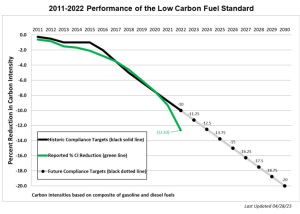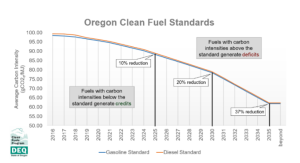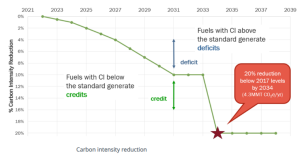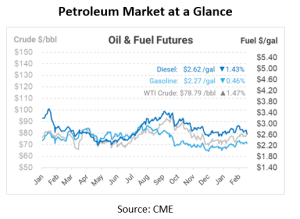
Navigating the Future: The West Coast’s Path to Low-Carbon Transportation
In the quest for transitioning from fossil fuels to cleaner alternatives, the West Coast of the United States has been at the forefront of environmental legislation. California’s Low Carbon Fuel Standard (LCFS), Oregon’s Clean Fuels Program (CFP), and Washington’s Clean Fuel Standard (CFS) are reshaping the transportation sector to reduce carbon intensity. These policy regimes, aimed at reducing the carbon intensity of transportation fuels, are now being used as a model for other states seeking similar outcomes.
California led the charge in 2009 with its LCFS, setting an ambitious goal to reduce the carbon intensity of transportation fuels by 20% by 2030. This program employs a credit-trading system, requiring fuel producers to either meet the annual carbon intensity targets or purchase credits from those who produce or import lower-carbon fuels. The program’s broad scope, encompassing gasoline, diesel, natural gas, and electricity, has significantly accelerated the shift towards cleaner alternatives like biofuels, hydrogen, and electricity. The impact of California’s LCFS extends beyond emissions reduction, leading to a growing clean energy market within the state.

Source: California LCFS
Following California’s footsteps, Oregon introduced its CFP, targeting a 10% reduction in fuel carbon intensity by 2025 compared to 2015 levels. The program has spurred significant investment in biofuels and electric vehicle infrastructure, leading to innovation and economic growth within those sectors. Oregon’s commitment has reduced the state’s dependence on fossil fuels, creating a market that incentivizes cleaner product development.

The most recent addition to this transition, Washington’s CFS was launched with the objective of achieving a 20% reduction in fuel carbon intensity by 2035. Though still in its early stages, the program has already begun to influence the industry by encouraging investments in cleaner fuel production. Introducing a compliance fee for producers not meeting targets adds an additional incentive to expedite the transition towards more sustainable fuels.

Source: Washington CFS
The collective impact of these programs has been a significant uptick in zero-tailpipe-emission vehicle adoption and biofuel consumption. Although these programs have not been without challenges, they highlight the feasibility of state-sanctioned greenhouse gas reduction. The environmental success of these programs has inspired states like Illinois, Michigan, Minnesota, New Jersey, New Mexico, and New York to explore similar initiatives, reflecting a nationwide recognition of the need for sustainable transportation solutions.
The pioneering efforts of the West Coast in implementing LCFS, CFP, and CFS programs have set a precedent for low-carbon transportation. These initiatives are reshaping the fuel industry towards a more sustainable and diversified future.
Achieve your Goals with Mansfield
In this ever-evolving landscape, Mansfield is a dependable partner for businesses seeking to navigate LCFS markets and prepare for future policies. With deep expertise and a commitment to sustainability, Mansfield is equipped to assist companies in achieving compliance, managing fuel costs, and strategizing for the long term.
Mansfield can help you develop and execute a low-carbon fuel strategy that meets your needs and gets you to your destination without compromise. Contact our team of sustainability experts to learn more about our energy solutions.

This article is part of Biofuels
Tagged:
MARKET CONDITION REPORT - DISCLAIMER
The information contained herein is derived from sources believed to be reliable; however, this information is not guaranteed as to its accuracy or completeness. Furthermore, no responsibility is assumed for use of this material and no express or implied warranties or guarantees are made. This material and any view or comment expressed herein are provided for informational purposes only and should not be construed in any way as an inducement or recommendation to buy or sell products, commodity futures or options contracts.





